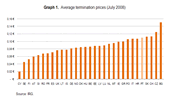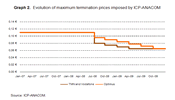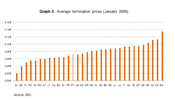Following approval in October 2007 of a DD, subsequently submitted to public consultation on the specification obligation to control prices with respect to the wholesale markets of voice call termination on individual mobile networks 1, and its notification to the EC, ICP-ANACOM approved a decision on this matter in July 2008.
Since ICP-ANACOM considered that analysis of the wholesale markets for voice call termination on individual mobile networks conducted in 2005, and subsequently notified to the EC, remained valid, along with the respective conclusions regarding the identification of operators with SMP, and the ex-ante regulatory obligations imposed upon such operators, this decision focused only on the specification of the obligation to control the prices which apply to mobile operators in business in Portugal.
It is recalled that the operators in business which were notified in 2005 as operators with SMP were TMN - Telecomunicações Móveis Nacionais, S.A. (TMN), Vodafone Portugal, Comunicações Pessoais, S.A. (Vodafone) and Optimus - Telecomunicações, S.A. (Optimus). This latter operator, in the meantime, merged with Novis Telecom, S.A. (Novis), operator of the same economic group, taking the name Sonaecom - Serviços de Comunicações, S.A. (Sonaecom).
The ex-ante regulatory obligations applicable to these operators are: (i) responding to reasonable requests for access, (ii) non-discrimination in the provision of access and interconnection and the respective provision of information, (iii) transparency in the publication of information, (iv ) control of prices and costs accounting, and (v) separation of accounts.
However, the need to properly assess the matter, together with the decision of the operators to practice the maximum termination prices permitted under the 2005 determination, led to the maintenance of termination prices between October 2006 and the end of the first half of 2008, with the result that Portugal's ranking worsened in comparison with other European countries in July 2008, and the country had the fifth highest prices, as can be seen in Graph 1.
Graph 1. Average termination prices (July 2008)
Likewise, the decision took into account other factors of equal importance, such as the need to improve the conditions of competition between fixed and mobile national networks. Bearing in mind this objective, the decision had the aim of reducing the costs incurred by operators which were not part of the mobile market, including fixed operators, allowing them to compete on better terms with respect to calls to mobile terminals, thereby avoiding distortions in the patterns of traffic between fixed and mobile networks and allowing each of these networks to be used more efficiently while taking the underlying costs into account.
ICP-ANACOM took account of the market failure associated with practice of exploiting network effects by larger operators, which had already been identified in the decision adopted in 2005, whereby it decided to further reduce mobile termination rates to 0.065 euros per minute and to introduce an asymmetry for well-defined temporary period.
Accordingly new decision determined reductions in mobile termination price caps, with effect until the end of 2009, as detailed in Table 1.
|
Applicable from: |
For the following operators |
|
|
TMN and Vodafone |
Optimus |
|
|
15 July 2008 |
0.080 |
0.096 |
|
1 October 2008 |
0.075 |
0.090 |
|
1 January 2009 |
0.070 |
0.084 |
|
1 April 2009 |
0.065 |
0.078 |
|
1 July 2009 |
0.065 |
0.072 |
|
1 October 2009 |
0.065 |
|
Source: ICP-ANACOM.
The following graph illustrates the downward trend in terminations prices ordered by ICP-ANACOM.
Graph 2. Evolution of maximum termination prices imposed by ICP-ANACOM
In this context, this decision aims to create conditions for healthy and balanced competition for the benefit of end-users and an increase in global well-being, with the ultimate aim of upholding consumer interests by ensuring the sustainability of the various mobile operators and enabling, in the short term, reductions in retail prices, in particularly for consumers of fixed-mobile calls, whose high price has led to a substantial reduction in the volumes for these types of traffic. In this regard it is noted that the retail prices of fixed mobile calls declined by around 22 percent between January 2008 and January 2009, and they are expected to continue to evolve in that direction following the reduction in termination prices determined by this Authority for 2009.
In the specific case of fixed-mobile calls, the benefit derived from the fall in mobile termination prices has been estimated at more than 60 million euros for the period covered by the decision of ICP-ANACOM. This benefit will be transferred to a very large extent to consumers, given that the market leader - PTC - is regulated with respect to retail prices and is obliged to fully reflect the imposed reductions in mobile termination rates in the prices charged for these calls.
In terms of wholesale prices, Portugal was presented, in early 2009, as the country with the thirteenth lowest prices of all European countries, as seen in Graph 3.
Graph 3. Average termination prices (January 2009)
A review of the decision is planned during the second half of 2009, taking account of developments occurring at EU level and the analysis of the relevant market.
1 This is market 16 as identified in the previous version of the EC Recommendation on relevant markets.







